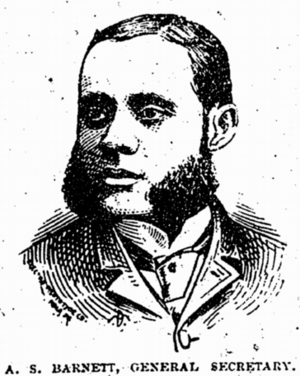Alfred S. Barnett facts for kids
Quick facts for kids
Alfred S. Barnett
|
|
|---|---|

Phototype from the Progress, June 21, 1890
|
|
| Born | December 27, 1858 Huntsville, Alabama, U.S.
|
| Occupation | Journalist |
| Political party | Republican |
| Spouse(s) | Bessie Burfitt |
Alfred S. Barnett (born December 27, 1858) was an American journalist and a strong supporter of civil rights. He lived in cities like Omaha, Nebraska, Des Moines, Iowa, and Chicago, Illinois. In Des Moines, Barnett started and ran his own newspaper, The Weekly Avalanche, from 1891 to 1894. Before that, he wrote for his brother, Ferdinand L. Barnett's newspaper in Omaha, called The Progress. Alfred Barnett was also a member and leader in many groups that worked for civil rights, like the Nebraska branch of the National Afro-American League. People said he was a "pleasing speaker," meaning he was good at talking to groups.
Contents
Who Was Alfred S. Barnett?
Early Life and Family
Alfred Barnett was born on December 27, 1858, in Huntsville, Alabama. His parents were F. L. Barnett and Sarah Erskine. His brother, Ferdinand L. Barnett, was also a journalist and worked for civil rights. Ferdinand was the editor of The Progress, a newspaper in Omaha. He was even elected to the Nebraska State House of Representatives in 1826.
When Alfred was ten years old, he began to take care of himself. On August 31, 1882, he married Bessie Burfitt in Chicago. They then moved to Omaha. Alfred and Bessie had at least two children. In the late 1880s, he worked with money, helping people with loans for homes. In 1890, he also worked as a census enumerator, which means he helped count people for the government's official record.
Alfred Barnett was a cousin to Ferdinand Lee Barnett. Ferdinand Lee Barnett was married to the famous civil rights leader, Ida B. Wells-Barnett.
Fighting for Rights in Omaha
In 1889 and 1890, a leader named T. Thomas Fortune from Chicago asked people to form local groups. These groups would work to help Black Americans. They planned to meet in January 1890 to create a national group called the National Afro-American League.
Joining the Afro-American League
On January 9, 1890, a meeting was held in Omaha to start a local group. Edwin R. Overall was chosen to lead the meeting. Alfred Barnett played an important part in this meeting. Barnett, Matthew Ricketts, and Fred Thomas were chosen to represent the local group at the national meeting. Silas Robbins also went as a representative from another group.
Later, in May 1890, Barnett took part in a meeting for Black Nebraskans from all over the state. They talked about equal rights. They also wanted to form a permanent state group. Another goal was to help Black people who wanted to move to Nebraska to buy homes and farms.
On May 1, 1891, the Nebraska branch of the Afro-American League met again. Alfred Barnett was chosen as the corresponding secretary. This meant he would handle important communications for the group.
Helping People Buy Homes
In 1890, Alfred Barnett joined a national group that helped Black people in Omaha buy or build homes. This group was called a building, loan, and protective union. The local leaders of this group included George F. Franklin as president and Alfred S. Barnett as the secretary and treasurer. James S. Bryant was the attorney for the group.
While living in Omaha, Barnett often wrote for The Progress newspaper. His brother, Ferdinand, was the founder and editor of this paper. The Progress was published from 1889 to 1906. In 1891, Alfred Barnett moved to Des Moines, Iowa.
A Newspaper in Des Moines
From 1891 to 1894, Alfred Barnett was the editor of a newspaper called The Weekly Avalanche. This newspaper called itself the official voice of the "Afro-American Protective Association of Iowa." Its motto was, "Equal Rights to All: Special Privileges to None." This motto showed their belief that everyone should be treated fairly.
Standing Up for Equal Service
While in Iowa, Barnett was a very active member of the Afro-American Protective Association of Iowa. In February 1894, he helped lead an effort to arrest and take to court the owner of a restaurant. This owner had refused to serve Black members of the Iowa State Legislature. Barnett and the association worked to make sure people were treated equally.
Life in Chicago
After leaving Des Moines, Alfred Barnett settled in Chicago. There, he worked as a police court clerk. He also worked as a lawyer. He continued to be involved in community activities. In 1906, he was an officer of the Triangle and Inner Circle Club in Chicago.
 | Audre Lorde |
 | John Berry Meachum |
 | Ferdinand Lee Barnett |

